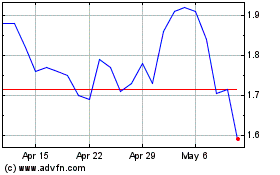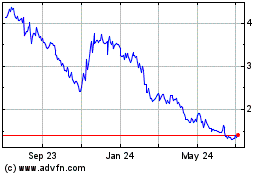Investigational Genetic Test May Help Address Common Problems in Prostate Cancer Diagnosis
April 29 2009 - 4:01PM
PR Newswire (US)
- Eight Studies Presented at Leading Urology Meeting Show that
Simple Urine Test for PCA3 Gene May Improve Accuracy of Prostate
Cancer Detection, Reduce Unnecessary Biopsies - SAN DIEGO, April 29
/PRNewswire-FirstCall/ -- Eight studies presented this week at the
annual meeting of the American Urological Association (AUA) suggest
that Gen-Probe's (NASDAQ:GPRO) investigational test for the highly
specific prostate cancer gene PCA3 may help address some of the
well-known challenges that urologists face when diagnosing prostate
cancer, such as accurately identifying potentially aggressive
cancers while minimizing "false positive" results that can lead to
overtreatment. In response to these studies and other promising
data from approximately 17 peer-reviewed publications, Gen-Probe
has decided to initiate a pivotal clinical study of its
investigational PCA3 assay that could lead to regulatory approval
by the U.S. Food and Drug Administration (FDA). "Based on the
results of our extensive clinical research studies and our European
commercial experience, we believe that our PCA3 assay, when used in
conjunction with other tests, can help predict the risk of a
positive follow-up biopsy, thereby aiding in the diagnosis of
prostate cancer," said Henry L. Nordhoff, Gen-Probe's chairman and
chief executive officer. "We are pleased to be moving ahead with a
U.S. clinical trial that could lead to improved patient care."
Gen-Probe's clinical study is expected to begin in the third
quarter of 2009 and take about a year to complete. The Company
anticipates it will involve more than 500 men, all of whom have had
a negative prostate biopsy, at 10 or more clinical trial sites.
Scientific studies presented in recent weeks have added to the
uncertainties surrounding prostate cancer screening and diagnosis.
For example, researchers from the U.S. National Cancer Institute
recently published results in the New England Journal of Medicine
(NEJM) from a 17-year study that showed that six annual screenings
for prostate cancer led to more diagnoses of the disease, but no
fewer prostate cancer deaths. "We need better tools to detect
significant prostate cancers earlier, to reduce unnecessary
biopsies and overtreatment, and to identify which tumors are most
likely to progress," said Gerald L. Andriole, MD, lead author of
the NEJM paper and professor and chief of urologic surgery at the
Washington University School of Medicine in St. Louis. "Early data
on the investigational PCA3 genetic test are promising, and we look
forward to additional studies to confirm its clinical utility." Key
AUA Studies Results from selected PCA3 studies presented at the AUA
meeting showed that: -- PCA3 scores are correlated with the
probability of a positive initial prostate biopsy in men with
elevated serum PSA levels. In addition, PCA3 scores were higher in
men whose prostate tumors had higher Gleason scores, which indicate
cancer aggressiveness.(1) -- PCA3 scores correlated with prostate
cancer tumor volume, another measure of cancer aggressiveness, but
not with the size of the prostate gland itself. In addition, PCA3
scores were higher in men with pathologically significant cancers
than in men with insignificant ones.(2) -- PCA3 scores increased
the accuracy of a nomogram that doctors can use to predict which
men have low-grade or low-volume prostate cancers.(3) These men may
be candidates for active surveillance rather than aggressive
treatment. A nomogram is a two-dimensional diagram or graph that is
used to calculate the likelihood of a medical outcome. -- The PCA3
test was used reliably and consistently in a busy, community-based
screening setting.(4) About PCA3 PCA3 is a gene that is highly
over-expressed in more than 90% of prostate tumors, indicating that
it may be a useful biomarker for prostate cancer. Studies have
shown that because PCA3 is highly specific for prostate cancer, it
predicts the results of repeat biopsies more accurately than
traditional prostate-specific antigen (PSA) testing.(5) Gen-Probe's
PROGENSA(R) PCA3 assay, which has been CE-marked for sale in the
European Union, is the first urine-based molecular diagnostic assay
for prostate cancer. The test has not been approved for marketing
in the United States. Gen-Probe acquired exclusive worldwide
diagnostic rights to the PCA3 gene from DiagnoCure in November of
2003. About Gen-Probe Gen-Probe Incorporated is a global leader in
the development, manufacture and marketing of rapid, accurate and
cost-effective nucleic acid tests (NATs) that are used primarily to
diagnose human diseases and screen donated human blood. Gen-Probe
has more than 25 years of NAT expertise, and received the 2004
National Medal of Technology, America's highest honor for
technological innovation, for developing NAT assays for blood
screening. Gen-Probe is headquartered in San Diego and employs
approximately 1,200 people. For more information, go to
http://www.gen-probe.com/. Caution Regarding Forward-Looking
Statements Any statements in this press release about Gen-Probe's
expectations, beliefs, plans, objectives, assumptions or future
events or performance are not historical facts and are
forward-looking statements. These statements are often, but not
always, made through the use of words or phrases such as believe,
will, expect, anticipate, estimate, intend, plan and would. For
example, statements concerning new products, potential regulatory
approvals, customer adoption, and results of future R&D studies
are all forward-looking statements. Forward-looking statements are
not guarantees of performance. They involve known and unknown
risks, uncertainties and assumptions that may cause actual results,
levels of activity, performance or achievements to differ
materially from those expressed or implied by any forward-looking
statement. Some of the risks, uncertainties and assumptions that
could cause actual results to differ materially from estimates or
projections contained in the forward-looking statements include but
are not limited to: (i) the risk that subsequent studies of our
PCA3 assay may not reflect the results discussed here, (ii) the
risk that new products, such as our PCA3 assay, will not be cleared
for marketing in other markets in the timeframes we expect, if at
all, (iii) the possibility that the market for the sale of our new
products, such as our PCA3 test, may not develop as expected, (iv)
the risk that we may not be able to compete effectively, (v) the
risk that we may not be able to maintain our current corporate
collaborations and enter into new corporate collaborations or
customer contracts, and (vi) our dependence on third parties for
the distribution of some of our products. The foregoing describes
some, but not all, of the factors that could affect our ability to
achieve results described in any forward-looking statements. For
additional information about risks and uncertainties Gen-Probe
faces and a discussion of the Company's financial statements and
footnotes, see documents filed with the SEC, including the most
recent annual report on Form 10-K and all subsequent periodic
reports. We assume no obligation and expressly disclaim any duty to
update any forward-looking statement to reflect events or
circumstances after the date of this news release or to reflect the
occurrence of subsequent events. (1) AUA poster #1816, "Can
prostate cancer gene 3 (PCA3) predict initial biopsy outcome?"
Alexandre de la Taille, et al. (2) AUA poster #2127, "Prostate
cancer antigen 3 (PCA3) shows significant association to prostate
cancer volume but no correlation to total prostate volume or serum
Prostate Specific Antigen." Felix K h Chun, et al. (3) AUA poster
#155, "PCA3 score-based nomogram to predict low-volume / low-grade
prostate cancer in radical prostatectomy specimens." John Ward, et
al. (4) AUA poster #1814, "Feasibility of the PCA3 urine test in a
community- based screening setting." Adrie van Bokhoven, et al. (5)
UROLOGY(R) (69:532-535, 2007). Contact: Michael Watts Vice
president, investor relations and corporate communications
858-410-8673 DATASOURCE: Gen-Probe Incorporated CONTACT: Michael
Watts, Vice president, investor relations and corporate
communications of Gen-Probe, +1-858-410-8673 Web Site:
http://www.gen-probe.com/
Copyright
GoPro (NASDAQ:GPRO)
Historical Stock Chart
From Jun 2024 to Jul 2024

GoPro (NASDAQ:GPRO)
Historical Stock Chart
From Jul 2023 to Jul 2024
